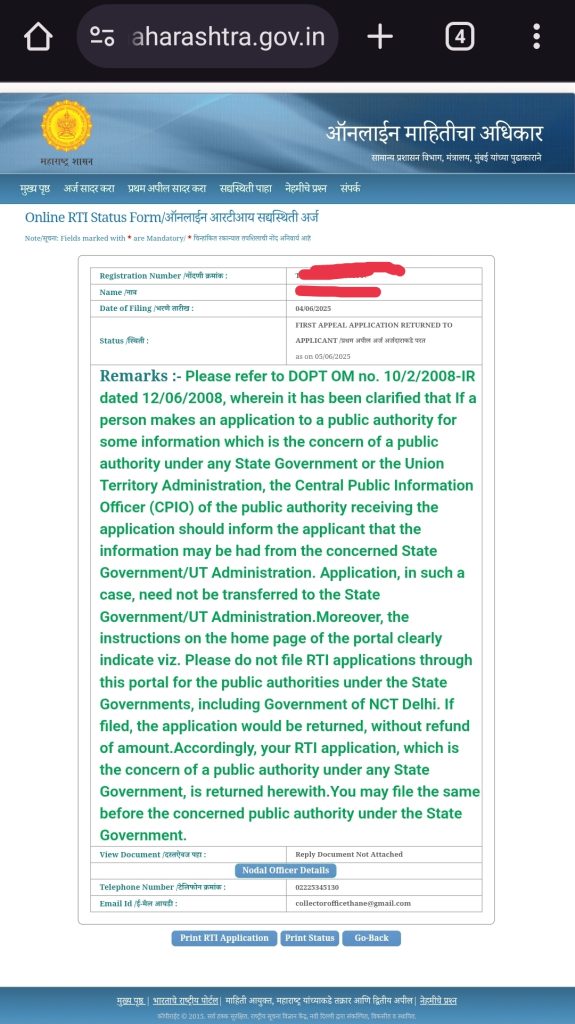Shock in Thane RTI Case — Citizen’s First Appeal Stone-walled With False Central Rules: Bureaucrats Twist Law to Hide Housing-Society Records
Appellate Authority absurdly claims the https://rtionline.maharashtra.gov.in is “meant for Central matters,” using the false pretext to block access to crucial housing-society records
A Thane citizen’s perfectly valid RTI application, filed through the Maharashtra RTI portal on 05 March 2025, has been derailed by a cut-and-paste excuse that legal experts call “a textbook abuse of the Act.”
After the Collector’s office rightly transferred the RTI to the relevant Municipal Corporation, the civic body failed to reply. The citizen then filed a First Appeal on 04 June 2025. Instead of hearing the matter, the Appellate Authority pushed the appeal to another officer, who rejected it by quoting DOPT OM No. 10/2/2008-IR (12 June 2008)—a circular meant only for Central-government RTIs.

What that reply claims—and why it is dead wrong
The DOPT OM states that if someone files an RTI to a Central ministry about information held by a State department, the Central CPIO should merely advise the applicant to approach the State body; the application “need not be transferred.”
Why this fails here:
- Right portal: The applicant used rtionline.maharashtra.gov.in—the State portal—not the Central one.
- Right authority: The Collector of Thane is already a State authority; no Central CPIO is involved.
- Proper transfer already done: The Collector had legally forwarded the RTI to the Municipal Corporation under Section 6(3); the municipal body was now duty-bound to reply within 30 days.
- First-appeal duty ignored: Under Section 19(1), the Appellate Authority must decide the appeal on merit or direct the lower office to furnish records—not invent an excuse to wash its hands of the matter.
By invoking an inapplicable Central circular, the officer has obstructed a statutory appellate process and effectively denied the petitioner’s constitutional right to information.
How the game was played
1️⃣ Collector transfers RTI to Municipal Corporation (legal).
2️⃣ Municipal Corporation stays silent (illegal delay).
3️⃣ Citizen files First Appeal (legal).
4️⃣ Appellate Authority shifts appeal to another officer (procedurally dubious).
5️⃣ That officer slaps a boiler-plate rejection quoting the Central OM (flatly irrelevant).
Activists say this manoeuvre is designed to “bury uncomfortable files” on housing-society irregularities—an area notorious for corruption.
Citizen fights back
- Legal Notice: The applicant has served the Hon. Collector with a notice demanding an inquiry into the errant officers, withdrawal of the bogus order, and immediate release of the requested documents.
- Second Appeal in the works: A petition to the Maharashtra State Information Commission will seek penalties under Section 20 for “malafide denial.”
“This isn’t a clerical mistake; it’s a deliberate attempt to sabotage transparency,” the applicant told YIIPPEE® News Network. “If bureaucrats weaponise wrong rules, the RTI Act becomes meaningless.”
Why this matters
If such misapplication of Central memoranda is allowed to stand, every State-level RTI in Maharashtra could be torpedoed with the same bogus logic, gutting the very backbone of citizens’ right to know. The Thane episode is therefore a critical test case for the State’s commitment to open governance.
YIIPPEE® News Network will follow the story through the Second Appeal stage and report on any disciplinary action—or lack thereof—taken against the officials involved.
